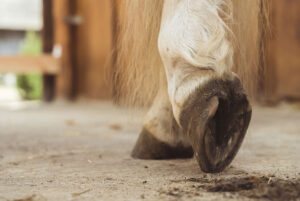Feeding Horses With Endocrine Disorders
- Topics: Article, Basic Care, Body Condition, Cushing's Disease, Feeding Old Horses, Grains, Hay, Horse Care, Laminitis (Founder), Metabolic Problems, Metabolic Syndrome, Metabolism, Nutrition, Nutrition-Related Problems, Obesity, Older Horse Care Concerns, Pasture and Forages, Special Needs Nutrition

Nutritional management revolves around weight loss and low-sugar and -starch diets
The horse’s body functions like a harmonious orchestra. Think of the endocrine system, which includes organs such as the hypothalamus, pituitary gland, and thyroid gland, as that orchestra’s conductors. By secreting signaling chemicals called hormones (your hypothetical batons) into the bloodstream, they can direct the entire orchestra or just individual musicians—specific organs—to perform certain tasks. The results? A pitch-perfect symphony.
Now, think of endocrine disorders as resulting from misdirected musicians. When organs and glands over- or under-secrete hormones or when tumors affect an organ, cacophony happens. The two most common equine endocrine disorders are pituitary pars intermedia dysfunction (PPID, or equine Cushing’s disease) and equine metabolic syndrome (EMS).
What is nutrition’s role in the development and management of these disorders and, more importantly, in reducing a horse’s risk of developing secondary diseases such as laminitis? Let’s take a look
Create a free account with TheHorse.com to view this content.
TheHorse.com is home to thousands of free articles about horse health care. In order to access some of our exclusive free content, you must be signed into TheHorse.com.
Start your free account today!
Already have an account?
and continue reading.

Related Articles
Stay on top of the most recent Horse Health news with


















